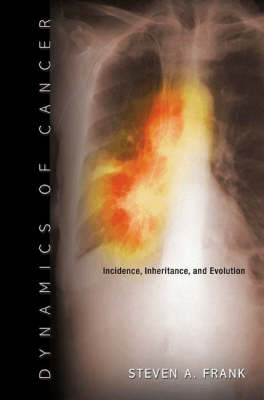
Dynamics of Cancer
Princeton University Press (Verlag)
978-0-691-13365-2 (ISBN)
- Titel ist leider vergriffen;
keine Neuauflage - Artikel merken
The onset of cancer presents one of the most fundamental problems in modern biology. In "Dynamics of Cancer", Steven Frank produces the first comprehensive analysis of how particular genetic and environmental causes influence the age of onset. The book provides a unique conceptual and historical framework for understanding the causes of cancer and other diseases that increase with age. Using a novel quantitative framework of reliability and multistage breakdown, Frank unifies molecular, demographic, and evolutionary levels of analysis. He interprets a wide variety of observations on the age of cancer onset, the genetic and environmental causes of disease, and the organization of tissues with regard to stem cell biology and somatic mutation. Frank uses new quantitative methods to tackle some of the classic problems in cancer biology and aging: how the rate of increase in the incidence of lung cancer declines after individuals quit smoking, the distinction between the dosage of a chemical carcinogen and the time of exposure, and the role of inherited genetic variation in familial patterns of cancer. This is the only book that presents a full analysis of the age of cancer onset.
It is a superb teaching tool and a rich source of ideas for new and experienced researchers. For cancer biologists, population geneticists, evolutionary biologists, and demographers interested in aging, this book provides new insight into disease progression, the inheritance of predisposition to disease, and the evolutionary processes that have shaped organismal design.
Steven A. Frank is professor of biology at the University of California, Irvine. He is the author of "Immunology and Evolution of Infectious Disease and Foundations of Social Evolution" (both Princeton).
Chapter 1: Introduction 1 1.1 Aims 2 1.2 How to Read 4 1.3 Chapter Summaries 5 PART I: BACKGROUND Chapter 2: Age of Cancer Incidence 17 2.1 Incidence and Acceleration 19 2.2 Different Cancers 20 2.3 Childhood Cancers 23 2.4 Inheritance 25 2.5 Carcinogens 29 2.6 Sex Differences 32 2.7 Summary 35 Chapter 3: Multistage Progression 36 3.1 Terminology 37 3.2 What Is Multistage Progression? 38 3.3 Multistage Progression in Colorectal Cancer 39 3.4 Alternative Pathways to Colorectal Cancer 43 3.5 Changes during Progression 49 3.6 What Physical Changes Drive Progression? 50 3.7 What Processes Change during Progression? 51 3.8 How Do Changes Accumulate in Cell Lineages? 55 3.9 Summary 58 Chapter 4: History of Theories 59 4.1 Origins of Multistage Theory 61 4.2 A Way to Test Multistage Models 65 4.3 Cancer Is a Genetic Disease 69 4.4 Can Normal Somatic Mutation Rates Explain Multistage Progression? 71 4.5 Clonal Expansion of Premalignant Stages 74 4.6 The Geometry of Cell Lineages 76 4.7 Hypermutation, Chromosomal Instability, and Selection 78 4.8 Epigenetics: Methylation and Acetylation 79 4.9 Summary 80 PART II: DYNAMICS Chapter 5: Progression Dynamics 85 5.1 Background 86 5.2 Observations to Be Explained 89 5.3 Progression Dynamics through Multiple Stages 90 5.4 Why Study Quantitative Theories? 93 5.5 The Basic Model 93 5.6 Technical Definitions of Incidence and Acceleration 94 5.7 Summary 95 Chapter 6: Theory I 96 6.1 Approach 97 6.2 Solution with Equal Transition Rates 97 6.3 Parallel Evolution within Each Individual 100 6.4 Unequal Transition Rates 103 6.5 Time-Varying Transition Rates 109 6.6 Summary 114 Chapter 7: Theory II 115 7.1 Multiple Pathways of Progression 116 7.2 Discrete Genetic Heterogeneity 120 7.3 Continuous Genetic and Environmental Heterogeneity 129 7.4 Weibull and Gompertz Models 136 7.5 Weibull Analysis of Carcinogen Dose-Response Curves 139 7.6 Summary 142 Chapter 8: Genetics of Progression 143 8.1 Comparison between Genotypes in Human Populations 144 8.2 Comparison between Genotypes in Laboratory Populations 154 8.3 Polygenic Heterogeneity 160 8.4 Summary 164 Chapter 9: Carcinogens 165 9.1 Carcinogen Dose-Response 166 9.2 Cessation of Carcinogen Exposure 180 9.3 Mechanistic Hypotheses and Comparative Tests 190 9.4 Summary 201 Chapter 10: Aging 202 10.1 Leading Causes of Death 203 10.2 Multistage Hypotheses 206 10.3 Reliability Models 207 10.4 Conclusions 209 10.5 Summary 209 PART III: EVOLUTION Chapter 11: Inheritance 213 11.1 Genetic Variants Affect Progression and Incidence 214 11.2 Progression and Incidence Affect Genetic Variation 234 11.3 Few Common or Many Rare Variants? 243 11.4 Summary 250 Chapter 12: Stem Cells: Tissue Renewal 251 12.1 Background 252 12.2 Stem-Transit Program of Renewal 253 12.3 Symmetric versus Asymmetric Stem Cell Divisions 264 12.4 Asymmetric Mitoses and the Stem Line Mutation Rate 265 12.5 Tissue Compartments and Repression of Competition 269 12.6 Summary 270 Chapter 13: Stem Cells: Population Genetics 271 13.1 Mutations during Development 272 13.2 Stem-Transit Design 280 13.3 Symmetric versus Asymmetric Mitoses 283 13.4 Summary 285 Chapter 14: Cell Lineage History 286 14.1 Reconstructing Cellular Phylogeny 287 14.2 Demography of Progression 295 14.3 Somatic Mosaicism 304 14.4 Summary 308 Chapter 15: Conclusions 309 Appendix: Incidence 314 References 335 Author Index 361 Subject Index 373
| Erscheint lt. Verlag | 22.7.2007 |
|---|---|
| Reihe/Serie | Princeton Series in Evolutionary Biology |
| Zusatzinfo | 5 halftones. 106 line illus. 3 tables. |
| Verlagsort | New Jersey |
| Sprache | englisch |
| Maße | 152 x 235 mm |
| Gewicht | 709 g |
| Themenwelt | Informatik ► Weitere Themen ► Bioinformatik |
| Medizin / Pharmazie ► Medizinische Fachgebiete ► Onkologie | |
| Naturwissenschaften ► Biologie ► Genetik / Molekularbiologie | |
| ISBN-10 | 0-691-13365-4 / 0691133654 |
| ISBN-13 | 978-0-691-13365-2 / 9780691133652 |
| Zustand | Neuware |
| Haben Sie eine Frage zum Produkt? |
aus dem Bereich


